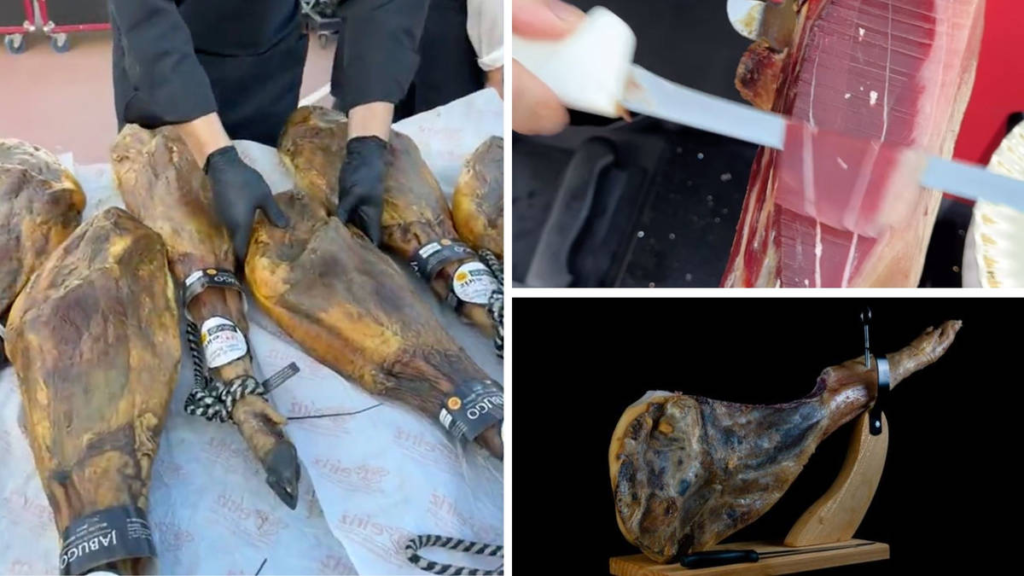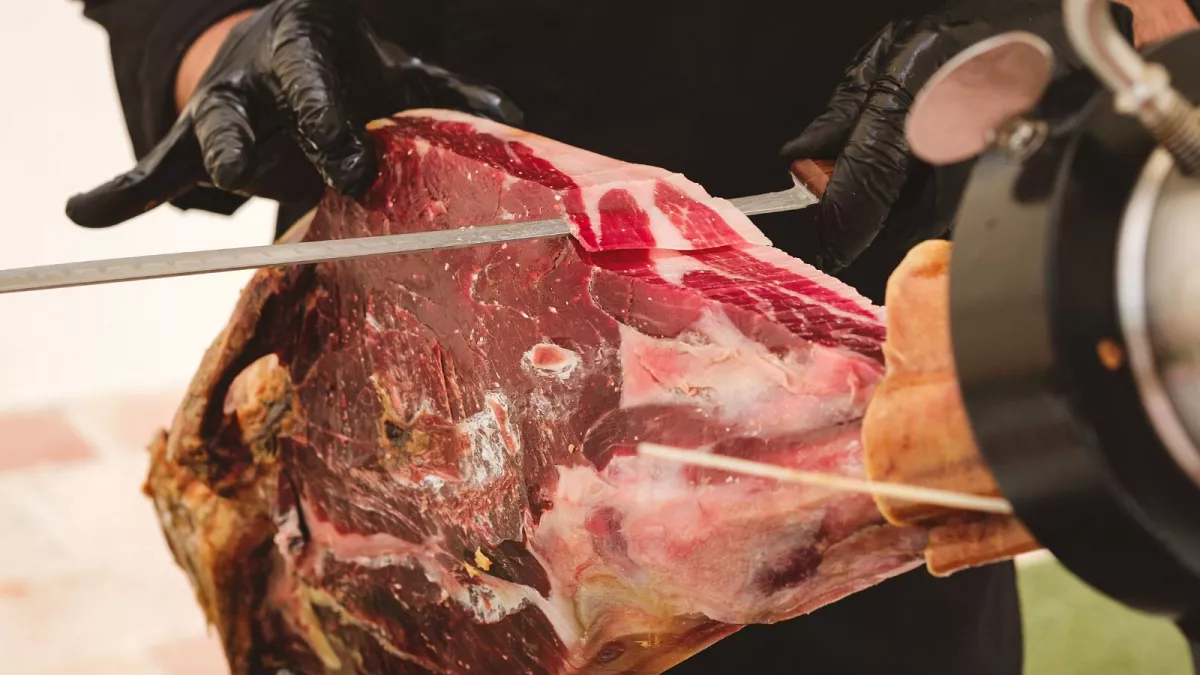The picturesque region of Huelva in southern Spain has witnessed an audacious theft that has left a family-run business reeling. Thieves stole 400 legs of Iberian acorn-fed ham, valued at €200,000, from Jamones Eíriz in the village of Corteconcepción.
This delicacy, prized for its Protected Designation of Origin (PDO) Jabugo seal, symbolizes years of dedication and meticulous craftsmanship. The incident not only threatens the livelihood of a small enterprise but also highlights the growing trend of high-value food thefts across Europe.
A Cultural Heritage Under Threat
Iberian ham, particularly the acorn-fed variety, is deeply embedded in Spanish culture. Known locally as Jamón Ibérico de Bellota, it’s more than just a gourmet product—it’s a national treasure.
Produced from pigs raised on a diet of acorns, this ham undergoes a painstaking curing process that can last several years. Each leg embodies the unique terroir of the region, where the climate, traditional methods, and natural drying techniques contribute to its unmatched flavor.
Read : Ana de Armas Spotted Kissing Cuban President’s Stepson in Spain
The theft of 400 legs of such a valuable product represents more than financial loss; it’s a cultural blow. The ham’s Protected Designation of Origin Jabugo certification ensures its authenticity and traceability, safeguarding its heritage.
Read : Global Health index 2024 : top 10 heathiest countries in the world
Stealing these hams not only robs the family of revenue but also compromises the integrity of the market. Counterfeit or stolen goods could flood the market, diluting the brand’s value and deceiving consumers.
The Impact on Jamones Eíriz and the Local Community
Jamones Eíriz is no ordinary business. Founded in 1818, it’s one of the oldest ham producers in the region, with a legacy spanning generations.
Employing just 20 people—eight of whom are family members—the company epitomizes the spirit of small-scale, artisanal production. Their hams are known for their exceptional quality, achieved through traditional curing methods and natural drying processes.

Domingo Eíriz, a family member, expressed the emotional toll of the theft. “This is a destruction of years of work,” he lamented. The loss of such a significant quantity of product right before Christmas, their busiest season, compounds the impact.
This period is crucial for sales, as Iberian ham is a staple on festive tables across Spain. Missing out on this revenue could jeopardize the business’s future and affect the livelihoods of its employees.
Beyond the financial implications, there’s a deep sense of violation. The thieves didn’t just steal ham; they stole a piece of the family’s history and heritage. The heist feels personal, a sentiment echoed by many small business owners who have faced similar crimes.
Organized Crime and the Growing Trend of Food Thefts
This isn’t an isolated incident. Across Europe, high-value food thefts are on the rise. From wine heists in France to cheese burglaries in the UK, organized crime groups are targeting gourmet products that command high prices on the black market. These thefts are meticulously planned, often involving inside information and sophisticated logistics.
In the case of Jamones Eíriz, police suspect an inside job. The hams were stored in a location not typically used for such products, suggesting that the thieves had detailed knowledge of the facility.
“They knew exactly what they were doing,” Eíriz noted. The heist required precision and planning, indicating that this wasn’t a random act of theft.

The stolen hams’ value—over €500 per leg—makes them an attractive target. On the black market, these products can fetch high prices, especially if they retain their PDO certification marks. However, consumers need to be cautious.
Purchasing stolen goods not only perpetuates crime but also undermines legitimate businesses. Jamones Eíriz has urged customers to buy only from trusted sources, emphasizing the importance of traceability.
Preventing Future Heists: Challenges and Solutions
Preventing such thefts is challenging, especially for small businesses with limited resources. Installing advanced security systems can be costly, and rural locations may lack the infrastructure for robust surveillance.
However, there are steps that businesses can take. Strengthening physical security, conducting regular audits, and vetting employees carefully can help mitigate the risk.
Collaboration with local law enforcement is also crucial. In rural areas, community vigilance plays a key role. Establishing networks where businesses share information about suspicious activities can help prevent future incidents.
Moreover, raising public awareness about the consequences of buying stolen goods is essential. Consumers need to understand that supporting legitimate businesses protects cultural heritage and ensures product quality.
A Broader Economic and Cultural Impact
The theft at Jamones Eíriz highlights broader issues facing small-scale food producers in Europe. These businesses are custodians of culinary traditions, preserving methods that have been passed down through generations.

However, they are also vulnerable to economic pressures and criminal activities. Protecting them requires a concerted effort from governments, law enforcement, and consumers.
Iberian ham is more than just a product; it’s a symbol of Spanish identity. Its production involves not only skill but also respect for nature and tradition.
Each leg of ham tells a story—a story that begins in the dehesas (oak groves) of Spain, where pigs roam freely, and ends on the tables of families celebrating Christmas. The theft of 400 legs of this cherished product disrupts that story, but it also underscores the resilience of the community.
For Jamones Eíriz, the road to recovery will be challenging, but their commitment to quality and tradition remains unwavering. As they rebuild, they’ll rely on the support of their loyal customers and the broader community. This incident serves as a reminder of the importance of safeguarding cultural heritage and supporting small businesses.
In the face of adversity, the spirit of Corteconcepción—and the legacy of Jamones Eíriz—will endure.

